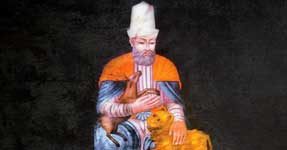Mohammed Ali, the founder of the dynasty which ruled Egypt until 1952, and a major political figure of his time, was born in Kavala in 1769. He was involved in the tobacco trade and promoted in the army. He was a brave and ambitious man, who assumed a leading role in developments in Egypt upon the departure of the French from the country (1801-1805) and eventually became the governor (Wali) of Egypt, a title granted to him by the Sublime Porte in 1805.
Inspired by western models, he had the army armed and trained to the highest standards. He reorganized agricultural production, introduced new crops, such as long fibre cotton, and took measures to encourage industry and trade. He pursued a secular educational system with the establishment of vocational schools and universities. He followed an indolent policy towards the vibrant communities of Greeks, Jews, Armenians, and European inhabitants of Egypt. He managed to improve the living standards of the wider population and to upgrade Egypt to the international scene. In 1840, after conflicts with the Sublime Porte, he gained the recognition of Sultan Abdul Mecid as the hereditary ruler of Egypt (Khedibe). He died in Cairo in 1849.






